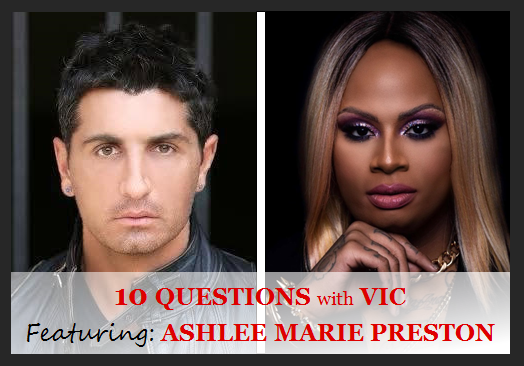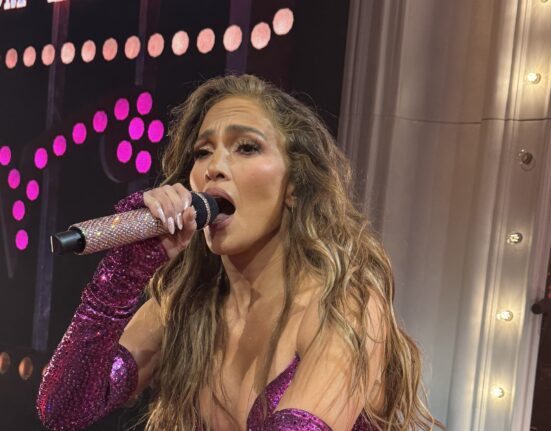
Ashlee Marie Preston is an award-winning media personality, producer and civil rights activist. She was the first trans woman to become editor in chief of a national publication and the first openly trans person to run for state office in California.
Preston was named one of The Root 100’s “Most Influential African Americans of 2017,” profiled as one of LOGO/NewNowNext’s 30 Most Influential LGBTQ Influencers of 2017 & 2018, PopSugar’s top 40 LGBTQs of 2017 and was listed on OUT Magazine’s OUT100 of 2018.
In addition, she made her TED Talk debut in September 2018 and was chosen as one of Coca Cola’s “Next Generation LGBTQ Leadership” influencers of 2018. This compassionate, unfiltered and unapologetic tour de force took time from her busy schedule to chat with me, bluntly.
Congratulations on your recent honor as one of OUT Magazine’s OUT100. You are one of the most prominent and high-profile trans individuals in the world. How do you reflect on the trans community’s achievements in the last five to 10 years?
Omg thank you! When I transitioned 15 years ago, most trans people (myself included) were primarily focused on assimilating into cisnormative roles, while exhausting ourselves over passibility politics. Over the last five to ten years the transgender community has come out from the shadows, unsubscribed from the idea that we’re “broken,” and are done apologizing for existing and taking up space. That doesn’t mean that gender dysphoria isn’t as real as it was in previous generations or that we won’t run into challenges as we navigate a heavily binary society. It just means that as the global conversation around trans identity continues to expand, we realize we are valid and that we get to honor every stage of our evolution—instead of buying into the idea that happiness only awaits us on the “other side.” I don’t feel I was born in the wrong body. I was born in a society that promotes the wrong information about sex and gender.
What is your assessment on the recent setbacks and attacks on the trans community, especially from the current administration? Also, please discuss some disparities within the trans community, such as the murder rate for trans women of color, for those who might pigeonhole all trans people in one group.
Trans folx are built for battle and will not be intimidated. Marsha P. Johnson, Sylvia Rivera, Miss Major, and the long lineage of trans activists who’ve come before us; taught us that our existence is resistance. We’ve always been here and we always will. We’re not going away. In fact, we’re just going to keep leaning in; popping up in the military, governmental offices, schools, faith based establishments—and wherever else we decide to fill space. We’re going to keep shaking the table because what they don’t realize is that the fiercest warriors are those who have absolutely nothing to lose but life itself. We’re coming for everything they said we couldn’t have.
We can’t talk about trans issues without discussing intersectionality. Basically, intersectionality describes multiple threats of description when an individual’s identity overlaps with multiple marginalized groups. Those experiences aren’t independent of one another but each informs the others. So as a black trans woman I’m not only navigating transphobia, but I’m also navigating misogynior and anti-blackness at the same time. It’s for that reason that the estimated life expectancy for a black trans woman is only 35 years old. If we truly want liberation for the transgender community; it’s important that we prioritize the most vulnerable of community. When black trans women experience liberation—so will everyone else.
Tell me about your #ThriveOver35 campaign.
The #ThriveOver35 Campaign is really an opportunity for black trans women to reimagine our futures outside of a prison cell or casket. We are more than a statistic and we have the capacity to do and be anything our hearts desire. I felt it was important to promote positive messaging and visuals of black trans excellence and to completely transform the narrative. The campaign is also an opportunity to educate would be allies about our barriers to progress and challenges that present impediments to our ability to thrive. Instead of media consuming our erasure as if it’s trauma porn; I wanted to peel back the lens and take a raw look at the circumstances which place us in front of the barrel of the gun—or the blade of the knife.
Some day we will reach a point when someone’s gender identity is a non-issue, when your “trans-ness” does not lead your name; and you are certainly a lot more than your trans identity and your diverse work reflects that. Is that a fair statement? Will you elaborate as historically the first trans woman to become editor in chief of a national publication and the first openly trans person to run for state office in California? Lastly, being a famous trans voice, trailblazer and leader comes with an awesome responsibility. Is it ever too much?
You pretty much said it. My trans identity is only a facet of who I am. More importantly, the trans experience is not one size fits all. We have just as much beautiful depth and complexity as our cisnormative peers. And it’s within those folds that our humanity lies. My hope is that when others are able to access the full range of who we are; they finally retire their perception of us as caricatures or fetish-based beings.
The most important practice I’ve adopted this past year has been self-care. I find it so interesting when people glamorize activism. There is very little perk to it in all actuality. I rarely receive compensation for my labor; others won’t always see the immediate value in your work or the sacrifices behind the scenes, and ultimately the folx that everyone runs to rarely have anyone to run to. I’ve learned to be as kind to myself as someone I’d advocate for. If we don’t know how to advocate for ourselves we can’t be as impactful in showing up for others. I’ve learned better boundaries, the power of no, and more importantly how to delegate; allowing others to participate in their own liberation. I think the reason most activists burn out so fast is because we have to learn to let go of the reigns a bit and place more emphasis on mentoring those coming behind us.
You recently started a grassroots humanitarian campaign to help Central American asylum seekers who were not allowed to enter the USA and are being kept in limbo in Tijuana, Mexico. What made you decide to gather tens of thousands of dollars worth of donations and head across the border, and how has that experience been?
I was born in America but had no choice but to flee Kentucky. I knew that it wasn’t a safe place for me to navigate gender expression or sexual orientation. I had to temporarily leave my family, friends, and everything that mattered to me in hopes that I could build a better life and have a fighting chance. That’s not an easy thing to do; but it’s necessary in order to not only survive but to thrive. The audacity of our government to stand on stolen land and deem another human being as illegal, and meet their pleas with tear gas is absolutely egregious. I felt that sense the current administration refuses to do the right thing it was an opportunity to self-govern. We don’t need permission from a higher authority to access our individual capacity to express compassion and empathy for one another. Many of us are sick of the circus and are yearning for the solution. Love is always the answer and the solution.
I reached out to my network and asked friends to volunteer their time, cars, resources, and bodies to go into Mexico and make it very clear that Trump is not our leader and he does not speak for all of us. I also loved that there several other black people in our “Compassion Caravan.” Anti-blackness is global and when brown people come to America from other countries sadly enough they subscribe to it. As our migrant families are granted asylum and start their new lives in America; my hope is that when they’re in brown spaces that spew anti-blackness they will fiercely disrupt it in solidarity because we stood and will always stand in solidarity with them.
It was especially important as a trans woman to make that trip because while we helped LGBTQ migrants as part of our mission, we also extended resources to the migrant families who in some cases were violently abusing the LGBTQ caravaners to the point that they had to be taken to undisclosed locations outside of the encampment for their own safety.
How is it when a fan who has never met you recognizes you in public and offers feedback?
It’s everything to me. I love, adore, and appreciate every single person who lifts up my work. Sometimes I’m just flat out exhausted but they are the ones who give me strength and courage to put one foot in front of the other and keep going.
Who are a few people that you admire?
I’m a huge Alexandria Ocasio-Cortez fan. Her vibrant spirit, unapologetic expression of her Latina roots and her refusal to kowtow to the establishment is so goals. AOC is bae.
Amanda Seales is everything. Her ability to use comedy to mobilize and heal trauma while telling the unadulterated truth is so magical. I’m hitting refresh on her Instagram several times a day.
Lady Gaga because there’s so much heart, depth, and intellect to her that I’m not sure the most people can really digest. I’m an empath and I feel like I have such a visceral connection with her.
Matt McGorry, Giacomo Gianniotti, LeBron James and Trevor Noah. They are the brothers/allies we all need and deserve—not to mention the absolute blueprint of what cisheteronormative masculinity should look like. I admire their commitment to women, black, brown, LGBTQ and other historically disenfranchised folx.
And of course Beyoncé. Slaying the game, snatching wigs, snagging awards, and still maintaining privacy out of the public eye. What’s not to admire about that?
What project(s) do you have coming up? Is acting in your future?
There’s a film coming up which will be my first. I have butterflies in my stomach—but I’m sure I’ll nail it. I’m just so extra sometimes. And there’s a non-scripted project coming up as well which I’m excited about. I love vibes which allow me to just simply be myself; and trust me—there’s never a dull moment.
For those who care about social justice and inequity, how can they help? What is your call to action?
Educate yourself instead of relying on the labor of those who are too busy fighting for their lives. Some of us are willing to educate you but the best allies are those who make sure we’re compensated for it.
Lastly, we all have something to contribute to progress. Not everyone is a protester or circuit public speaker—and that’s ok. Your music, art, films, and other creative talents carry just as much impact. The main thing is to refrain from staying silent when you witness injustices taking place. Silence is complicity.
Tell me a secret—a good one!
Sometimes I can do guacamole, but I absolutely hate avocado. I know most of California is ready to fight me now, but I said what I said.
Connect with Ashlee on Instagram @AshleeMariePreston


Leave feedback about this
You must be logged in to post a comment.